

Psychologists have actually put a lot of thought into these questions,
as different parenting styles affect children in different ways.
Find out more what are the four types of parenting styles and
their effects on kids.
Ready to learn more? Let’s dive in.
Importance Of Parenting - Significance Of Parenting. Becoming a parent is, indeed, the most rewarding experience one can ask for during one's entire lifetime.
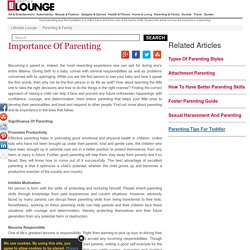
Giving birth to a baby comes with several responsibilities as well as problems concerned with its upbringing. While you are the first person to see your baby and hear it speak the first words, then why not be the first person in its life as well? How about teaching the little one to take the right decisions and how to do the things in the right manner? Finding the correct approach of raising a child can help it face and prevent any future unforeseen happenings with confidence, courage, and determination. Parenting skills: Parenting style and child social development. December 2014, 3rd ed.
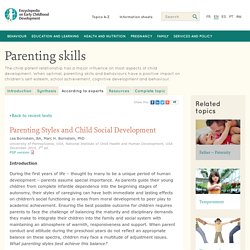
Introduction During the first years of life – thought by many to be a unique period of human development – parents assume special importance. As parents guide their young children from complete infantile dependence into the beginning stages of autonomy, their styles of caregiving can have both immediate and lasting effects on children’s social functioning in areas from moral development to peer play to academic achievement. Ensuring the best possible outcome for children requires parents to face the challenge of balancing the maturity and disciplinary demands they make to integrate their children into the family and social system with maintaining an atmosphere of warmth, responsiveness and support.
When parent conduct and attitude during the preschool years do not reflect an appropriate balance on these spectra, children may face a multitude of adjustment issues. Subject Problems Research Context Recent Research Results Conclusions References Bornstein MH. Parenting Styles: A Closer Look at a Well-Known Concept. Psychological factors contributing to parenting styles. Good, Bad or Ugly. Parenting Quotes. Biography of Diana Blumberg Baumrind. By Hendrika Vande Kemp, Fuller Theological Seminary* Biography of Diana Blumberg Baumrind Diana Blumberg was the first of two daughters born to Hyman and Mollie Blumberg, a lower middle-class couple residing in one of New York's Jewish enclaves.

Diana developed a strong intellectual friendship with her father, an atheist with a strong sense of Jewish cultural tradition, and she deeply admired the political activism of her uncle and aunt, Isadore Blumberg and Hannah (Levine). Hyman and Isadore, sons of Eastern European immigrants, were educated at City College and developed anti-Zionist and pro-Soviet philosophies shared by Diana. Isadore Blumberg schooled his niece in the principles of dialectical materialism, and imprinted her with his concern "to empower the disenfranchised and underrepresented. " Diana earned an AB in philosophy and psychology (1948) at Hunter College. Responsible relatedness undergirds all the more specific principles in Baumrind's writing. Note. Diana Baumrind: Parenting Styles & Theory - Video & Lesson Transcript. Baumrind's Model. Theories of Parenting. Identification of Parenting Styles. Baumrind's Four Parenting Styles.
Authoritative. Permissive. Uninvolved. Comparison of Parenting Styles. Authoritative vs Authoritarian. Authoritative vs Authoritarian: Characteristics. Authoritative vs Authoritarian: Kid's Outcome. Cultural Difference in Parenting Styles. Parenting differences between European and Asian Americans. ResearchLink 2.1 Russell AsianFam. Views on Parenting from Different Culture. How cultures around the world think about parenting. The crisis of American parenting, as anyone who has looked at the parenting section of a bookstore can attest, is that nobody knows what the hell they’re doing.
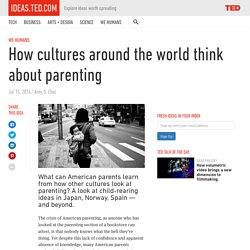
Yet despite this lack of confidence and apparent absence of knowledge, many American parents zealously believe that their choices carve out their children’s futures. Indeed, they seek the advice of expert after expert in the field in order to succeed at one goal: to raise the happiest, the most successful, and the most well-adjusted leaders of the future. But what dangers lay in thinking that there is one “right” way to parent? How much of how we parent is actually dictated by our culture?
How do the ways we parent express the essentialness of who we are, as a nation? “Americans have no script,” says Jennifer Senior (TED Talk: For parents, happiness is a very high bar), author of All Joy and No Fun: The Paradox of Modern Parenthood. Norwegians believe that it is better for children to be in daycare as toddlers. Lifespan Development. Relationships between parents and children continue to play a significant role in children’s development during early childhood.
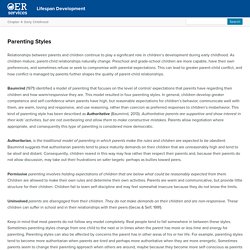
As children mature, parent-child relationships naturally change. Preschool and grade-school children are more capable, have their own preferences, and sometimes refuse or seek to compromise with parental expectations. This can lead to greater parent-child conflict, and how conflict is managed by parents further shapes the quality of parent-child relationships. How Do Cultural Differences Affect Parenting Techniques? The bond between a parent and child is the earliest of the relationships a child will have throughout her life, and can affect her development, according to the Urban Child Institute.
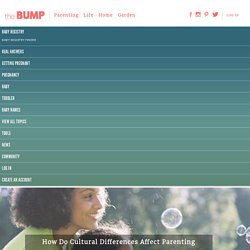
A positive and supportive attachment to a parent will help to protect the child from developing emotional and behavioral problems as she grows older. Cultural differences can affect the way a parent interacts with a child, but the UCI notes that parental responsiveness is key in any culture. Information and Education on Parenting Styles. Science: This Is the Best Parenting Style If You Want Your Kids to Be Happy and Rich. When it comes to folk wisdom on how to raise happy and successful kids, we all do the same thing.

We look at the families around us and try to identify what's working and what's not. Then we attempt to copy the good and avoid the bad. That family with the perpetually whiny toddler and no official bedtime? They could be your inspiration for early nights for your own little ones. The cousin who calls mommy for even the most minor crisis? But of course anecdotes aren't as reliable as science, and it's easy to miss confounding variables or behind-closed-door complications when observing those around for you child rearing inspiration. Implications for the Policy and Services Perspective.